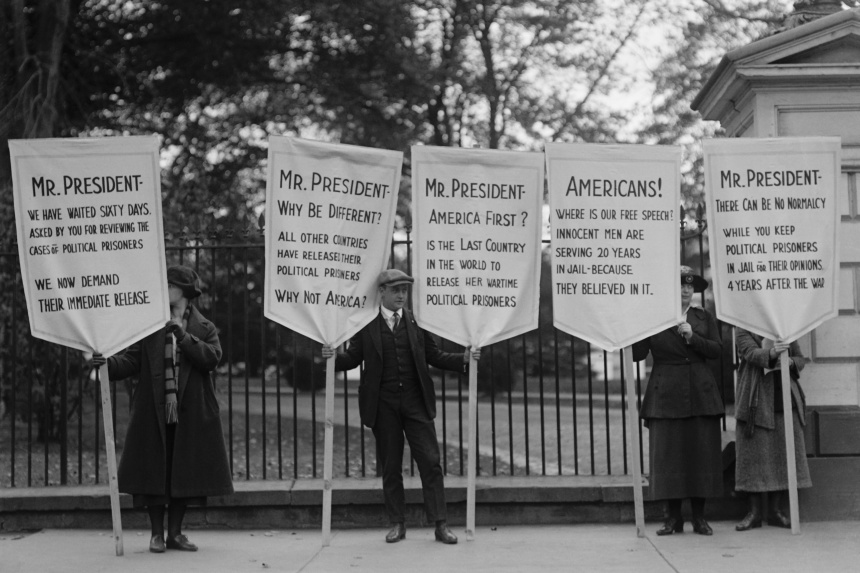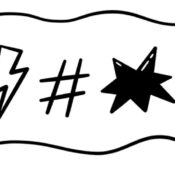Earlier this month, President Trump, angered over critical reporting by journalists, pondered via Twitter whether he should revoke their press credentials. This bitter feud between press and president has raised an old question: Does the president have the right to silence people who criticize him or his policies?
Congress debated that question 100 years ago and believed so strongly in such executive privilege that it passed the Espionage and Sedition Acts to stifle dissent in America.
President Woodrow Wilson expected criticism after he asked Congress to declare war on Germany, sending America into World War I. He had, after all, been elected on his record of keeping the U.S. out of the war. Now he’d committed the country to that contest, and he knew he’d need strong public support for the war effort. He would tolerate no criticism that might discourage military enlistment, the sale of war bonds, or cooperation with rationing programs. He needed loyal Americans — loyal, that is, to his plans.
But there were strong anti-war feelings among pacifists, socialists, and union organizers, as well as immigrants. At the beginning of the 20th century, there were eight million first- and second-generation Germans living in the U.S. Many retained a strong attachment to the land of their birth. Wilson believed they might dampen the war effort with pro-German sentiments, and he feared German agents hid among them, embedded at all levels of American society. German saboteurs had already destroyed a major munitions depot in New York Harbor.
Wilson proposed a bill to silence criticism of the war. The result was the Espionage Act, which became law on June 15, 1917, and prohibited anyone from aiding America’s enemies in wartime or interfering with the armed forces and its recruitment efforts. It also made it illegal to make false statements that disrupted military operations, promoted the enemy’s success, or led to insubordination or disloyalty.
But the Espionage Act didn’t end the dissent. A Montana rancher publicly called President Wilson “a Wall Street tool” and said he’d leave the country rather than go to war. He was tried under the Espionage Act but acquitted on appeal because he didn’t directly affect war efforts. In response, the U.S. attorney general called for a law to broaden the Act’s powers.
So Congress extended government control to affect speech and writing. The Sedition Act of 1918 made it a crime to use “disloyal, profane, scurrilous, or abusive language” about America’s government, its flag, or its armed forces. Making any statement that inspired contempt in others for the government or its institutions was also outlawed.
Theodore Roosevelt protested the law, saying it was “a proposal to make Americans subjects instead of citizens.”
But some legislators thought it didn’t go far enough to root out dissident thinking. A New Mexico congressman was disappointed the Act didn’t provide the death penalty. And an unsigned editorial in The Washington Post stated, “Enemy propaganda must be stopped, even if a few lynchings may occur.”
The Saturday Evening Post editors supported the Act. The government didn’t need a sedition law to protect itself, they said, but it had to show patriotic Americans it wouldn’t allow anyone to criticize their loyalty or the national cause. This explanation probably referred to the mobs of outraged citizens who had attacked and even lynched people suspected of disloyalty.
It was in the Post’s best interest to support the law at the time. Had the editors been critical instead, the Sedition Act would have empowered the postmaster general to block all delivery of the Post, as he had with other publications.
Two thousand cases were tried under the Sedition Act, half of which resulted in conviction. It was invoked most often in Western states, where it was used frequently to prosecute members of what was considered a radical workers’ group, the Industrial Workers of the World (IWW).
The Sedition Act was repealed in 1920 and the offenders were pardoned, though well after the war had ended. The U.S. attorney responsible for the pardons praised the government for detaining a number of dissidents in prison after the war “to set an example of firmness that will go down in history as a warning to those who in the future might be inclined to harbinger and harass the government.”
As much as the president would enjoy being able to legally silence his detractors, their public criticism is still protected by law.
Featured image: Shutterstock
Become a Saturday Evening Post member and enjoy unlimited access. Subscribe now




Comments
I just learned a lot more about World War I from this feature. While in school we learned mainly about the European countries involved; who the U.S. was fighting for and against, but never about controversy within the U.S. itself at the time regarding it.
President Wilson did seem like he was coming perilously close to extinguishing The First Amendment domestically during this time. War can push Presidents to the outer limits of what they would never consider doing normally.
This decade of 1910-1920 (to me) seems to be one of the most turbulent, being eclipsed only by 1964-’74. Historically, the Women’s Suffrage movement was portrayed to be the dominant source of what we heard about in terms of domestic controversy here. Adding all THIS controversy though, I’m seeing a turbulent pattern link between the 1860’s, 1910’s, 1960’s and 2010’s I hadn’t previously realized.